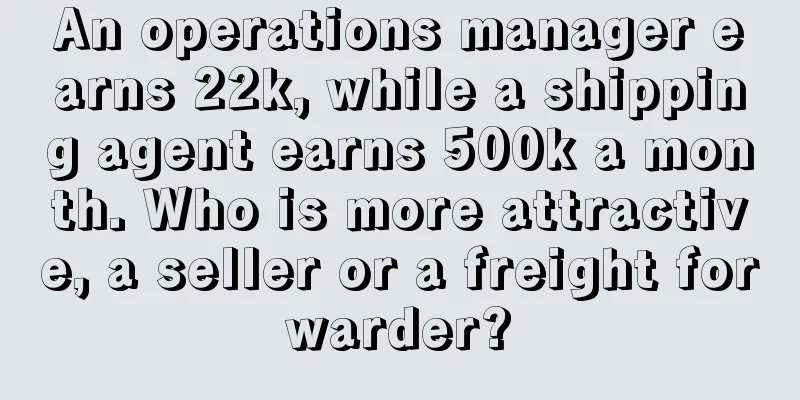An operations manager earns 22k, while a shipping agent earns 500k a month. Who is more attractive, a seller or a freight forwarder?

|
After the beginning of the year, the cross-border e-commerce industry has experienced a "personnel earthquake". The salaries of experienced operators have risen sharply, and the base salary of operation supervisors has even reached 22k, which has attracted the envy of many industry service providers. However, the salaries of service providers should not be underestimated. In the cross-border e-commerce industry, which sector is more popular?
The salary of an operations manager is 22k, and the monthly income of a shipping agent is 500k
As usual, there was a wave of resignations after the Spring Festival, and this year's personnel changes seemed to be even greater.
A seller lamented: "There was really a wave of resignations in March. I found that all the operations of the company next door had left. This morning I suddenly saw the boss next door sitting there alone packing." There have been resignation talks for several consecutive days, which is a phenomenon that exists in many companies.
This year, the salary of industry operators has increased significantly compared to before. Taking Shenzhen as an example, the base salary is 7k and 8k is common. Among them, operators with one year of experience almost start at 8k. A seller said that the current situation is indeed that with 1-2 years of experience and no foreign language skills, the base salary can be 10,000, plus commissions and year-end bonuses, 20,000 is basically no problem.
What is the salary level for operations positions? An operations person said that the salary is already 10K, and the comprehensive salary will basically reach 12K-20K in half a year, which means at least 150K-200K annual salary in a year. A cross-border e-commerce company recruited operations talents and offered a salary of up to 22K, which is about the supervisor level, causing a lot of discussion in the industry. However, more operations people said that the current base salary is between 4K-5K, and they have not enjoyed the benefits of this wave of operations salary increase.
Some sellers commented on this wave of personnel turnover: a large number of new sellers have poured in, and excellent operators are scarce. Excellent ones work alone, ordinary operators are rising, and some low-level operators are promoted. Even so, the salary and popularity of operators still attract some envious eyes. A freight forwarder asked, are there any companies that want inexperienced newbies? How much does the logistics industry earn? One seller revealed that last year, the monthly income of shipping business was 500,000, which is staggering. Even with such income, some comments still say that it is "too little", and some sellers even claim that their freight forwarders earn a million a month.
Is this salary level common in the logistics industry? The editor asked several freight forwarders about this, and they all said that they could not even dream of it. Some freight forwarders thought it was too exaggerated, while others thought that the person involved might be a first-level agent, which was understandable.
A monthly salary of around 10,000 yuan seems to be more common. A freight forwarder said that he earned 3,000 yuan in 2015 and 10,000-20,000 yuan in 2018, working from 10 a.m. to 11 p.m., answering numerous calls and doing all kinds of work. Although it has become a consensus that "logistics made money last year", many freight forwarders still believe that e-commerce made the most money, and with logistics freight rates soaring several times last year, many sellers complained that they were "working for freight forwarders".
Some freight forwarders want to try to be operators, but some platform operators switch to freight forwarding. Operators vs freight forwarders, which one do you think is better?
In terms of logistics, from the beginning of the year to now, there have been frequent delays in logistics in Europe and the United States. Some sellers have not picked up their goods even one month after they arrived at the port, and they are very anxious.
The last leg of the journey in Europe and the United States is congested, and sellers are in urgent need of optimizing delivery methods
Under the influence of the global epidemic, logistics timeliness has been greatly delayed. Some goods have been floating on the sea for months, while some goods that were lucky enough to arrive at the port were ruthlessly stuck at the tail end.
Nowadays, many sellers are anxious to optimize the end-of-line delivery methods, and they want to know which logistics company is faster and more reliable. An informed seller said that some time ago, some industry peers reported that there were problems with FedEx delivery and Amazon would not accept it. After learning that the end of the ocean shipping was taken over by the freight forwarder FedEx, the seller became worried.
The last leg is a relatively important part of delivery, which is directly related to whether the goods can reach the buyer normally. At present, is there any relatively faster last-mile delivery?
Some industry insiders said that in general, FedEx > UPS (Haipai) > FedEx. Now the market has basically ruled out FedEx delivery, and the most popular choices are UPS and FedEx. For FedEx, the backend is directly sent to the Amazon warehouse, but the disadvantage is that there is no express delivery number to check where the goods are. For UPS delivery, it is called Hai + Pai, which is relatively more expensive than FedEx, but the whole logistics process is visible.
Many sellers use UPS for the final delivery of their goods , as the entire process is visible and it is favored by many sellers. However, some sellers have also encountered troubles when using UPS for delivery.
UPS delivery boxes are stuck together
A seller said that when using UPS to ship boxes to FBA, the boxes were stuck together and he received an email from Amazon.
Amazon said in the email : "We are writing to inform you that we have suspended your ability to create or modify shipments to FBA due to multiple issues we have identified during your inbound shipment process. As part of the inbound performance feedback process, you must confirm the issues before you can create or modify any shipments."
Amazon also informed sellers: One or more boxes in your shipment exceeds the maximum size requirements. Products and shipments that do not comply with our policies may be deemed unsaleable or disposed of without compensation. Repeated violations of Amazon's safety requirements may result in the suspension of your shipping privileges.
After further reviewing the issue on the Manage FBA Shipments page, the seller discovered that someone had glued several boxes they were sending to FBA together to create an oversized box that was 28.60 inches tall and weighed 64 pounds.
The seller speculates that this incident was either done by UPS or a new employee at the Amazon warehouse. In any case, the seller is sure that it was impossible for him to glue the boxes together and did his best to comply with FBA restrictions.
Since the shipment could not be created, the seller acknowledged the issue and submitted a request for investigation. In this case, the seller told the platform that he was happy to pay the unplanned service fee. He explained that the boxes were never glued together and this must have happened during transportation. Unfortunately, the seller had no proof because no separate photos were taken when the items were shipped.
The seller further asked whether this would affect the inbound shipping metrics or cause the inbound shipping functionality to be suspended as this was beyond their control.
After acknowledging the issue, the seller was fortunately able to restore the ability to ship to FBA, but he wants to find out if this is the last time this has happened, or if this type of problem occurs frequently?
It is worth mentioning that in the past few months, the seller sent a 52-pound box instead of less than 50 pounds. This was his own mistake, and he immediately switched it back when he realized that if he put the box on the scale, it might be a few pounds off. But this is the only time he has encountered inbound shipping problems in the past, and it has not occurred in other cases. Due to his own mistake, the seller admitted the problem and paid the fee.
But the boxes stuck together, which was not a subjective mistake, but I still had to pay extra fees.
Non-subjective problems may arise at any time in logistics and distribution, so sellers need to be careful. Operations, logistics, cross-border e-commerce |
<<: Strict investigation! 5.3 million infringing products were seized, involving multiple brands
Recommend
What is Finnish Financial Supervisory Authority (FIN-FSA)? Finnish Financial Supervisory Authority (FIN-FSA) Review, Features
<span data-docs-delta="[[20,{"gallery"...
The exchange rate is too low! The top seller in the category also "abandoned the account and left"
Is the exchange rate the last straw that breaks t...
Sellers beware! Google identity verification scam
Identity verification is very common around us. I...
eBay UK updates some item descriptions with new rules, Shopee event deposit policy is coming soon
eBay UK updates some item descriptions Recently ,...
What is Shixin Huida Freight? Shixin Huida Freight Review, Features
Shixin Huida Freight provides one-stop logistics ...
What is Chuhaitong? Chuhaitong Review, Features
Chuhaitong is an intelligent foreign trade marketi...
What is United Billing Solutions? United Billing Solutions Review, Features
United Billing Solutions full-service billing cov...
What is Cotton On? Cotton On Review, Features
Cotton On, also known as the Australian Fashion Br...
Attention! Many European countries were hit by strong storms, ports were closed, and flights were suspended
According to foreign media reports, on February 1...
Payoneer and Wayfair jointly recruit investors in seven cities to help home furnishing brands expand overseas
Payoneer and Wayfair will jointly empower Chinese...
What is Quip? Quip Review, Features
Founded in 2014, Quip is a healthcare company foc...
Sellers are delighted! Established e-commerce platforms reduce commissions to encourage off-site traffic
According to the latest news from the platform, E...
What is CITYOCEAN Logistics? CITYOCEAN Logistics Review, Features
Pengchenghai Logistics (Shenzhen Pengchenghai Logi...
A new round of crackdown! A group of sellers have been closed down
During the peak season, platforms such as Amazon ...
What is Zhongdi International Logistics? Zhongdi International Logistics Review, Features
China Express International Logistics is a modern ...









